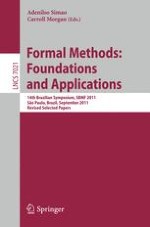2011 | Buch
Formal Methods, Foundations and Applications
14th Brazilian Symposium, SBMF 2011, São Paulo, Brazil, September 26-30, 2011, Revised Selected Papers
herausgegeben von: Adenilso Simao, Carroll Morgan
Verlag: Springer Berlin Heidelberg
Buchreihe : Lecture Notes in Computer Science
